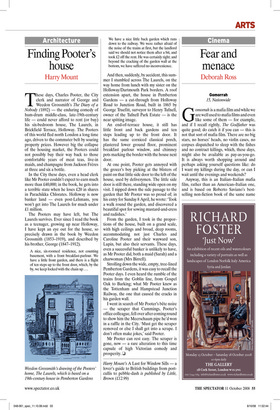Finding Pooter’s house
Harry Mount
These days, Charles Pooter, the City clerk and narrator of George and Weedon Grossmith’s The Diary of a Nobody (1892) — the enduring comedy of hum-drum middle-class, late-19th-century life — could never afford to rent (or buy) his six-bedroom house, The Laurels, in Brickfield Terrace, Holloway. The Pooters of this world fled north London a long time ago, driven to the commuter belt by soaring property prices. However big the collapse of the housing market, the Pooters could not possibly buy their way back to those comfortable years of meat teas, live-in maids, and champagne from Jackson Frères at three and six a bottle.
In the City these days, even a head clerk like Mr Pooter couldn’t expect to earn much more than £40,000; in the book, he gets into a terrible state when he loses £20 in shares in Parachikka Chlorates. Holloway is now banker land — even post-Lehmans, you won’t get into The Laurels for much under £1 million.
The Pooters may have left, but The Laurels survives. Ever since I read the book as a teenager, growing up near Holloway, I have kept an eye out for the house, so precisely drawn in the book by Weedon Grossmith (1853–1919), and described by his brother, George (1847–1912).
A nice, six-roomed residence, not counting basement, with a front breakfast-parlour. We have a little front garden, and there is a flight of ten steps up to the front door, which, by the by, we keep locked with the chain up ... We have a nice little back garden which runs down to the railway. We were rather afraid of the noise of the trains at first, but the landlord said we should not notice them after a bit, and took £2 off the rent. He was certainly right; and beyond the cracking of the garden wall at the bottom, we have suffered no inconvenience.
And then, suddenly, by accident, this summer I stumbled across The Laurels, on the way home from lunch with my sister on the Holloway/Dartmouth Park borders. A roof extension apart, the house in Pemberton Gardens — a cut-through from Holloway Road to Junction Road, built in 1865 by George Truefitt, surveyor to Henry Tufnell, owner of the Tufnell Park Estate — is the near spitting image.
An end-of-terrace house, it still has little front and back gardens and ten steps leading up to the front door. It has the same corniced classical porch, plastered lower ground floor, prominent breakfast parlour window, and chimney pots marking the border with the house next door.
At one point, Pooter gets annoyed with the grocer’s boy picking at the blisters of paint on that little side door to the left of the house, used by deliverymen. The little side door is still there, standing wide open on my visit. I nipped down the side passage to the garden that Mr Pooter was so proud of; in his entry for Sunday 8 April, he wrote: ‘Took a walk round the garden, and discovered a beautiful spot for sowing mustard-and-cress and radishes.’ From the garden, I took in the proportions of the house, built on a grand scale, with high ceilings and broad, deep rooms, accommodating not just Charles and Caroline Pooter and their wayward son, Lupin, but also their servants. These days, even a successful banker is unlikely to have, as Mr Pooter did, both a maid (Sarah) and a charwoman (Mrs Birrell).
Strolling down the wide, empty, tree-lined Pemberton Gardens, it was easy to recall the Pooter days. I even heard the rumble of the trains from the Goblin line, from Gospel Oak to Barking; what Mr Pooter knew as the Tottenham and Hampstead Junction Railway, the one that caused the cracks in his garden wall.
I went in search of Mr Pooter’s bête noire — the scraper that Cummings, Pooter’s office colleague, fell over after coming round to show him the Meerschaum pipe he’d won in a raffle in the City. ‘Must get the scraper removed or else I shall get into a scrape. I don’t often make jokes,’ said Pooter.
Mr Pooter can rest easy. The scraper is gone, now — a rare alteration to this time capsule of high Victorian comedy and prosperity. ❑ Harry Mount’s A Lust for Window Sills — a lover’s guide to British buildings from portcullis to pebble-dash is published by Little, Brown (£12.99)










































































 Previous page
Previous page